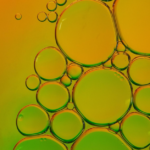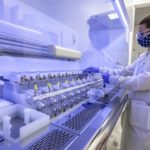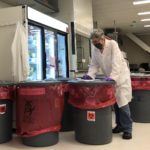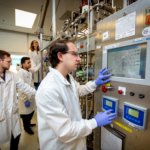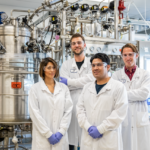Researchers at Berkeley Lab have transformed lignin, a waste product of the paper industry, into a precursor for a useful chemical with a wide range of potential applications. The work was a collaboration between the Advanced Biofuels and Bioproducts Process Development Unit, the Joint BioEnergy Institute, and the Queens University of Charlotte. In a recent study, they demonstrated their ability to convert lignin into a chemical compound that is a building block of bio-based ionic liquids.
Scaling Up Science During a Global Emergency
Showing an inspiring knack for innovation under pressure, the global scientific community has developed promising tests and treatments for COVID-19 in the span of just a few months. But moving medical technologies from conception to deployment at such an unprecedented rate comes with a multitude of hurdles, one of which is the obvious challenge of scale. How do companies turn a handful of prototypes or a few flasks of drug-secreting cells into a mass-produced product ready for market? This is the primary focus for process engineer scientists at the Advanced Biofuels and Bioproducts Process Development Unit (ABPDU) at Lawrence Berkeley National Laboratory (Berkeley Lab).
Masks On, Ready to Work: Meet the People Supporting COVID-19 Science
Rosanne Boudreau’s job, as the safety coordinator for Berkeley Lab’s Biosciences Area at its satellite site in Emeryville, California, is to make sure all experiments and research are conducted safely. Before any experiment starts, she will look at all the possible hazards and help implement any controls that should be put into place to mitigate those hazards.
ABPDU Celebrates Successes and its 50th Industry Partner
The U.S. Department of Energy’s (DOE’s) Advanced Biofuels and Bioproducts Process Development Unit (ABPDU) at Lawrence Berkeley National Laboratory is celebrating its 50th industry partner with Bay Area startup MycoWorks.
The Wild World of Microbe-Made Products – Skis Now Included
This winter, you can carve the fresh powder of the backcountry on a pair of high-performance skis made from a material produced by microscopic algae. The skis, made by Bay Area biotech company Checkerspot, are a new addition to the long list of products currently being made from chemicals and compounds produced by specially engineered microbes – a field known as biomanufacturing. Driven to offer smarter, more sustainable materials, fuels, foods, and medicines, more and more companies are turning to biomanufacturing over traditional methods.
- « Previous Page
- 1
- …
- 5
- 6
- 7
- 8
- 9
- …
- 13
- Next Page »
Was this page useful?


